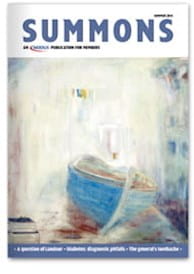They found their man in Macewen’s former assistant, Archibald Young. In his inaugural lecture, Professor Young promised to advance the reputation of the University of Glasgow and to keep its surgical school on the map; a promise which he amply fulfilled over the next 15 years.
Young served in two wars: the Boer War (second conflict, 1899-1902) and the Great War of 1914-18. In the former, he was attached as a civilian surgeon to field hospitals in Rondesbosch, Kroonstad and the Transvaal. The experience he gained there of treating war wounds confirmed surgery of the nervous system as his choice of specialty and resulted in the publication of ‘Injuries of the Peripheral Nerves’. This paper, one of his many contributions to surgical literature, was the only independent account from a civilian surgeon included in the official surgical report of the war. After his discharge, Young returned to Scotland to begin pioneering work in the reduction of fractures using metal plates. More controversially, he also experimented with the relief of peripheral pain by periarterial sympathectomy, ganglionectomy and sympathetic trunk resection in the treatment of Raynaud’s disease, Hirschsprung’s disease and arthritis.
Archibald Young was born in Carnarvon Street, Glasgow on 10 November, 1873. He was educated at The High School of Glasgow and the University of Glasgow where he graduated in science before incepting in medicine in 1893. He also studied abroad at schools in Berlin, Heidelberg and Breslau. Commenting on Young’s undergraduate record, the Glasgow surgeon James Nicoll revealed that he achieved “first class honours in nearly all his classes and carried off the medal or prize in six of them.” His early post-graduate work was no less stellar: the kind which “falls to few men.” Young secured coveted houseman appointments at Glasgow Royal Infirmary and the Western (under Macewen) and the position of private class assistant to the renowned pathologist Joseph Coates. From these early days, and throughout his career, he was noted for his reserved manner and devotion to duty, always attending his cases with meticulous care and precision. Nevertheless, in the summer of 1896, he appears to have relaxed somewhat by taking a summer job as a ship’s surgeon on the S.S. Canterbury.
After his return from the South African War, Young was a member of staff at the Western Infirmary for 37 years. He was a gifted, generous teacher and the Professor of Surgery at Anderson College from 1913. At the outbreak of the Great War, Young was attached as a neurological expert to the 4th Scottish General Hospital, Glasgow District, Scottish Command. The wartime Medical Research Committee instructed him to use the “present opportunities for special studies of nervous injuries and affections connected with the war.” Young obliged with a study of gunshot wounds which was read to the International Congress of Surgery in 1923. Later he was invited to speak at the Cairo Congress of 1936, where he complained that his work in periarterial neurectomy had been unfairly neglected. He was so confident in this procedure that he had had his own brachial artery stripped as one step in the treatment of X-ray dermatitis and ulceration but with mixed results.
Young’s rigid devotion and his similarly uncompromising attitude to his colleagues and professional assistants – the latter were required to follow his methods without question – may indicate an overbearing, dour temperament but his private life suggests otherwise. He and his wife Anna Stuart had two sons and the couple entertained frequently and lavishly at their magnificent town house in Park Circus. The family were honoured to entertain Marie Curie on her visit to Scotland. Young was also a traveller. Fluent in Italian and French, he was a sought-after speaker and received many invitations from abroad. He was one of the few foreign members of The Royal Academy of Physicians in Rome.
Archibald Young’s health had never been robust. He died on July 23, 1939 at the relatively young age of 65. The week before his death, he had risen from his bed to attend a ceremony in the University’s Hunter Hall, where he received a portrait of himself by James Gunn (pictured here). Young’s dry humour was evident on that occasion when he referred to his terminal illness, remarking: “One is more or less sure of today; one was less sure of tomorrow.”
As expected after the death of an academic of such calibre, obituaries appeared in the Lancet and the British Medical Journal but it is perhaps a better measure of the affection in which Young was held that the popular Scottish newspaperThe Sunday Post also printed a review of his life. Archibald Young was clearly respected by the ordinary folk of Glasgow. The Post noted that Young had joked that his epitaph should be: “He was kind to his fractures.” The newspaper article confirmed the truth of this by referring to Young’s former patients who recalled his unexpected visits to their bedside, always greeting them with the same gentle enquiry: “All well?”
Dr Jo Cummins is a dental surgeon and Honorary Research Fellow in History of Dentistry at the University of Glasgow. She is also an editor and writer
Source
- The Young Family Papers, Archive and Heritage, RCPSG
This page was correct at the time of publication. Any guidance is intended as general guidance for members only. If you are a member and need specific advice relating to your own circumstances, please contact one of our advisers.
Read more from this issue of Insight

Save this article
Save this article to a list of favourite articles which members can access in their account.
Save to library